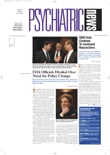New Hampshire psychiatrists and their allies have decisively defeated an attempt to open the road to prescribing rights for psychologists, said Alexander de Nesnera, M.D., who led the fight.
The New Hampshire legislature had rejected tries in previous years to grant prescribing rights, but the route this time was more circuitous.
In 2003 the House Executive Departments and Administrative Committee turned down a prescriptive authority bill by an 18-2 vote. Last year, a bill to study the issue was also defeated in the committee (Psychiatric News, March 19, 2004). Study bills are considered easier to pass because further legislation is required to implement any results of the study.
This year's battle was fought over a bill introduced into the state Senate to study the creation of an independent board of psychology. The State Board of Mental Health Practice now regulates psychologists in New Hampshire. That board also oversees licensing of a variety of nonmedical therapists such as pastoral psychotherapists, clinical mental health counselors, clinical social workers, and marriage and family therapists.
A recent legislative audit report addressed a number of administrative issues involving the board, including complaint resolution and office-management practices. Although the report said nothing substantive about the professions controlled by the board, the psychologists used it to argue for establishment of a separate psychology board.
“This is another attempt by psychologists to develop the structure, through an independent board, that would afford them the opportunity to develop scope-of-practice rules allowing them to prescribe potent psychiatric medications to our patients,” said de Nesnera, legislative representative and treasurer of the New Hampshire Psychiatric Society, in testimony before the state Senate committee. The audit report recommendations would be better addressed within the board rather than splintering it into different groups, he said.
In the end, the committee voted 4-2 to kill the bill, and the full Senate concurred on a voice vote.
De Nesnera said that other APA district branches can benefit from his experience in New Hampshire. “This may be one of the ways psychologists may attempt to get prescriptive rights. This attempt can be defeated. Study bills are notoriously difficult to kill, but we have been able to do it twice here by stressing to legislators the lack of need for a new board and the costs of conducting a study.”
New Hampshire Psychiatric Society members, including de Nesnera, also lobbied legislators on other issues including strengthening family-support programs, retaining current time limits on the length of involuntary commitment, and opposing legislation that would have compelled psychiatrists to inform the courts and the state if patient regained competency to stand trial for a criminal offense. ▪
